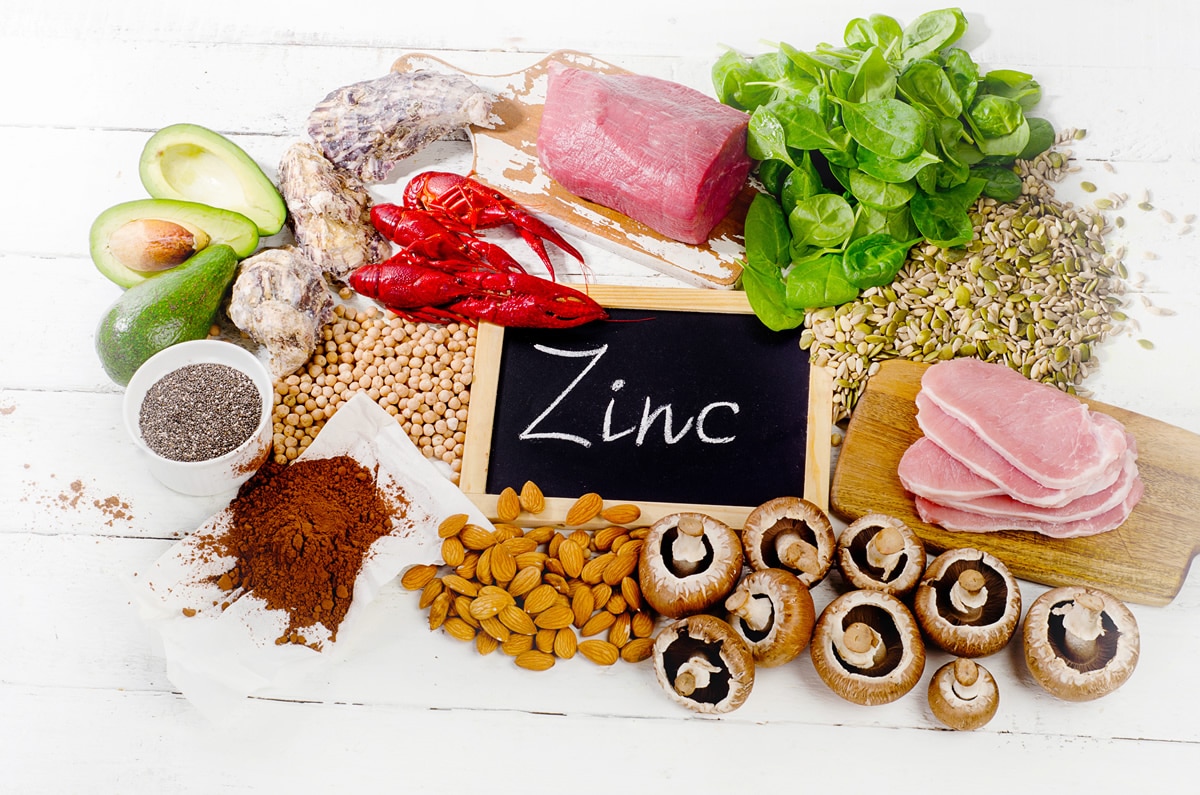
Keep your immune system strong and inflammation at bay
Zinc is a trace mineral that is essential for the body to function efficiently.
It’s needed for growth and development, to help the immune system fight off infections and to make cell proteins.
Without sufficient zinc, your health may be compromised.
Learn what zinc does in the body, how much you need to stay healthy and the best food sources of zinc.
What does Zinc do in the body?
Zinc is a vital nutrient that is involved in over 200 chemical reactions and functions in the body; other nutrients depend on zinc to get their “job” done. Zinc is needed to make up the protective barrier of cells (the mucous membranes) to prevent cells from becoming damaged by toxins and external harmful particles It also helps to break down alcohol in the body, enable us to digest food properly and make red blood cells to transport oxygen around the body. Zinc is particularly important for growth and development which is why good zinc levels is imperative during preconception, pregnancy, infancy and childhood.
Health benefits of Zinc
- Keeps your immune system strong as zinc is essential for the production and functioning of immune cells. Zinc activates the immune cells responsible for fighting infections. Taking zinc at the first signs of cold can reduce the length and severity of a cold considerably.
- Reduces inflammation and cell damage by lowering pro-inflammatory molecules. Zinc deficiency is linked to increased pain and chronic inflammation. Those who suffer from inflammatory conditions like arthritis would benefit from increasing their zinc levels.
- Accelerates wound healing as zinc is crucial for skin health and 5% of the body’s zinc is found in the skin. Zinc is needed to make collagen (a protein that provides structure to skin), to modulate the immune system and help control inflammation; all of which play an integral role when the skin is injured (burns, cuts, skin lacerations, ulcers).
- Improves skin health especially for acne, eczema and rosacea due to its anti-inflammatory properties. Zinc has also shown to reduce oil gland secretion which is helpful for those with acne.
- Regulates blood sugar levels by stimulating the action of insulin. Zinc binds to insulin receptors which stimulate the cells to take in the glucose and clear it from the bloodstream; therefore, reducing high blood sugar levels. Low zinc levels are common in diabetics.
- Promotes healthy digestion as zinc is needed to produce stomach acid and digestive enzymes that help us break down and digest food, especially proteins. Zinc is also vital for your senses (smell and taste) and a healthy appetite.
- Supports fertility health by regulating hormones, promoting ovulation and cell division, and improving sperm quality. Zinc protects sperm cells from damage (due to its antioxidant capability) and encourages the development of healthy sperm.
Zinc deficiency signs and symptoms
- Recurrent infections
- Decreased appetite
- Loss of taste or smell
- Slow growth and development (especially in babies and children)
- Poor wound healing and open skin sores
- Skin conditions including acne and eczema
- Unexplained weight loss
- Infertility and low libido
- Diarrhoea, bloating


Food sources of zinc
- Pine nuts, cashews, almonds, pecans, Brazil nuts
- Pumpkin seeds, sesame seeds
*Soak nuts and seeds overnight for at least 7 hours to activate enzymes that make them easier to absorb and digest. Discard the water afterwards and store the nuts/seeds in the fridge.
- Eggs (opt for organic)
- Oysters, crab, clams, haddock
- Chickpeas, lentils, beans, green peas
- Turnips, mushrooms, avocado, spinach, ginger root
- Red meat and poultry (opt for organic)
- Oats, quinoa, brown rice


How much Zinc do you need?
The Recommended Daily Allowance (RDA) of zinc varies dependent on age and sex. Those who are pregnant or breastfeeding have increased requirements.
Zinc RDA is as follows:
- Men (aged 19+): 11mg per day
- Women (aged 19+): 8mg per day
- Children (aged 0 – 18 years): 2 – 11mg per day, dependent on age and sex
- Pregnant/ breastfeeding women: 11 – 13mg per day
Therapeutic doses range from 15-50mg for adults and 5-10mg for children.
If taking supplemental zinc, the best form is zinc picolinate as it absorbs more readily into cells. Zinc citrate and zinc glycinate are also well absorbed by the body.
Before supplementing with any mineral, we recommend that you consult with a qualified nutritionist or naturopath so they can advise you on the correct dose for your needs.
Boost immune and skin health
Zinc is a vital mineral needed for hundreds of functions in the body including immune and skin health, blood sugar balance and digestion. Boost your zinc levels by including zinc-rich foods in your diet like nuts, seeds, legumes and whole grains. To learn more about the health benefits of zinc and other important nutrients, take a look at CNM’s Nutrition for Everyday Living short course.

